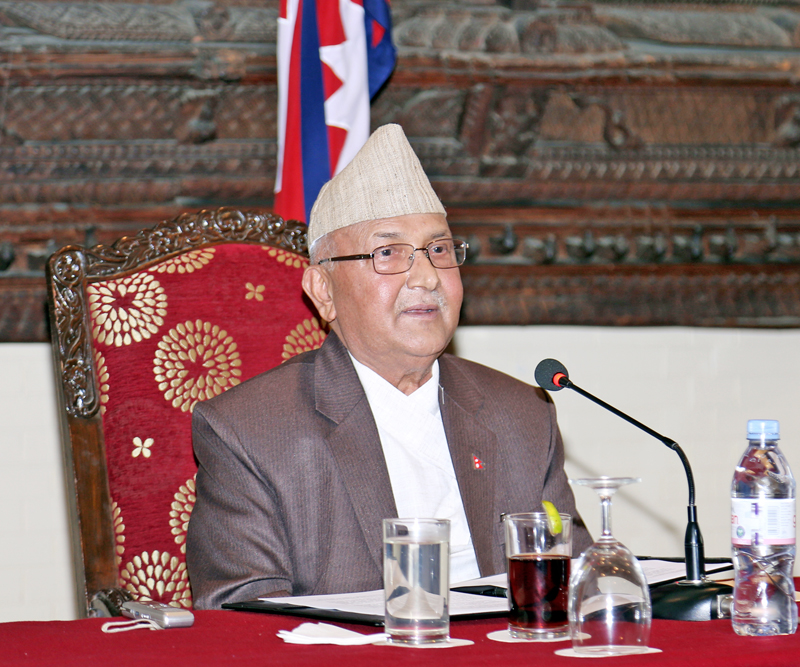PM claims govt not in crisis
- Seeks foreign support to implement statute and expedite post-earthquake reconstruction works
Kathmandu, May 11
At a time when speculation is rife on the fate of the government, Prime Minister KP Sharma Oli today said his government was not in crisis and it would hold elections of local bodies before December.
Briefing the diplomatic corpsat Hotel Yak & Yeti today, the PM said: “In democracy, every government is periodic and temporary. The claim that this is a temporary one is not true. It is not falling.”
He also stated that the government was not only ‘trying, but also going to meet the genuine demands of the agitating parties.
He requested all neighbouring and friendly countries and the international community to understand the exact situation, reality and efforts made towards resolving the Tarai issue.
Saying the main goals of his government were implementing the new constitution and accelerating the post-quake reconstruction, Oli said local elections have now become critical. “The election in local bodies has not been held for 15 years,” he said. “The election is important to accelerate reconstruction activities by increasing public participation at the local level.”
The government has decided to hold the polls of the Village Development Communities, municipalities and District Development Committees between mid-November and mid-December.
He also sought the help of friendly countries and development partners to expedite post-disaster reconstruction endeavours.
Before the PM spoke, Deputy Prime Minister and Minister for Foreign Affairs Kamal Thapa had briefed the diplomatic corps in detail about the political situation and progress in the reconstruction front.
Thapa said while visiting abroad, he felt there was misperception and misunderstanding about the new constitution that it was not a complete, inclusive and broad-based.
“The fact of the matter is that critics have either not studied the constitution fully or they do not want to assess its content fairly and objectively,” he said.
The Charter is broad-based, consultative and participative in terms of process; comprehensive, inclusive and substantive in terms of content; and forward-looking, progressive and dynamic in terms of orientation, he stated.
According to him, as many as 193 laws incompatible with the Charter have been amended and additional 138 laws would be enacted within a year to provide legal foundation for the full execution of the new constitution.
Thapa claimed that the government decided to hold election for the existing local bodies as it might take some time to determine the number and boundary and legal basis at the local level as per the federal structure.
“This will help ensure democratic exercise at the people’s level, rule of law and leadership of people’s representatives in local development and end the condition of absence of people’s representatives in local bodies,” said Thapa, who also holds the portfolio of the Ministry of Federal Affairs and Local Development.
Saying that transitional justice was complex process, he warned that the entire achievement of the peace process could come to nought if ‘we stuck to legal rigidity’.
“Rigid legality should not lead to an unravelling of the progress we have so far made in transforming society from conflict to peace and undermine our efforts to sustain peace,” he added.
This was the third official briefing for the diplomatic community since the formation of the new government in October last year.






